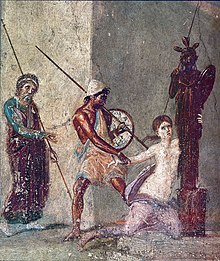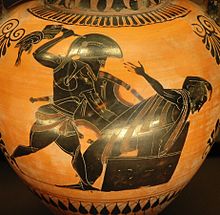| Priam, Last King of Troy | |
|---|---|
| King of Troy | |
 Scene from the Trojan War: Cassandra clings to the Palladium, the wooden cult image of Athene, while Ajax the Lesser is about to drag her away in front of her father Priam (standing on the left). Scene from the Trojan War: Cassandra clings to the Palladium, the wooden cult image of Athene, while Ajax the Lesser is about to drag her away in front of her father Priam (standing on the left). | |
| Predecessor | Laomedon |
| Genealogy | |
| Parents | Laomedon and Placia or Strymo (or Rhoeo) or Zeuxippe or Leucippe |
| Siblings | Tithonus, Lampus, Hicetaon, Clytius, Hesione, Cilla, Astyoche, Proclia, Aethilla, Medesicaste and Clytodora |
| Consort | (1) Hecuba (2) Castianeira (3) Laothoe (4) Alexirrhoe or Arisbe (5) unknown” |
| Offspring | (1) Hector, Paris, Cassandra, Helenus, Deiphobus, Troilus, Laodice, Polyxena, Creusa, Polydorus, Polites, Antiphus, Pammon, Hipponous and Iliona (2) Gorgythion (3) Lycaon (4) Aesacus (5) others |
In Greek mythology, Priam (/ˈpraɪ.əm/; Ancient Greek: Πρίαμος, pronounced [prí.amos]) was the legendary and last king of Troy during the Trojan War. He was the son of Laomedon. His many children included notable characters such as Hector, Paris, and Cassandra.
Etymology
Most scholars take the etymology of the name from the Luwian 𒉺𒊑𒀀𒈬𒀀 (Pa-ri-a-mu-a-, or “exceptionally courageous”), attested as the name of a man from Zazlippa, in Kizzuwatna. A similar form is attested transcribed in Greek as Paramoas near Kaisareia in Cappadocia. Some have identified Priam with the historical figure of Piyama-Radu, a warlord active in the vicinity of Wilusa. However, this identification is disputed, and is highly unlikely, given that he was known in Hittite records as being an ally of the Ahhiyawa against Wilusa.
A popular folk etymology derives the name from the Greek verb priamai, meaning 'to buy'. This in turn gives rise to a story of Priam's sister Hesione ransoming his freedom with a veil, from Heracles, thereby 'buying' him. This story is attested in the Bibliotheca and in other influential mythographical works dated to the first and second centuries AD. These sources are, however, dated much later than the first attestations of the name Priamos or Pariya-muwas, and thus are more problematic.
Description
Priam was described by the chronicler Malalas in his account of the Chronography as " tall for the age, big, good, ruddy-colored, light-eyed, long-nosed, eyebrows meeting, keen-eyed, gray, restrained". Meanwhile, in the account of Dares the Phrygian, he was illustrated as ". . .had a handsome face and a pleasant voice. He was large and swarthy".
Marriage and children
Priam is said to have fathered fifty sons and many daughters, with his chief wife Hecuba, daughter of the Phrygian king Dymas and many other wives and concubines. These children include famous mythological figures such as Hector, Paris, Helenus, Cassandra, Deiphobus, Troilus, Laodice, Polyxena, Creusa, and Polydorus. Priam was killed when he was around 80 years old by Achilles' son Neoptolemus.

Life
In Book 3 of Homer's Iliad, Priam tells Helen of Troy that he once helped King Mygdon of Phrygia in a battle against the Amazons.
When Hector is killed by Achilles, the Greek warrior treats the body with disrespect and refuses to give it back. According to Homer in book XXIV of the Iliad, Zeus sends the god Hermes to escort King Priam, Hector's father and the ruler of Troy, into the Greek camp. Priam tearfully pleads with Achilles to take pity on a father bereft of his son and return Hector's body. He invokes the memory of Achilles' own father, Peleus. Priam begs Achilles to pity him, saying "I have endured what no one on earth has ever done before – I put my lips to the hands of the man who killed my son." Deeply moved, Achilles relents and returns Hector's corpse to the Trojans. Both sides agree to a temporary truce, and Achilles gives Priam leave to hold a proper funeral for Hector, complete with funeral games. He promises that no Greek will engage in combat for at least nine days, but on the twelfth day of peace, the Greeks would all stand once more and the mighty war would continue.
Priam is killed during the Sack of Troy by Achilles' son Neoptolemus (also known as Pyrrhus). His death is graphically related in Book II of Virgil's Aeneid. In Virgil's description, Neoptolemus first kills Priam's son Polites in front of his father as he seeks sanctuary on the altar of Zeus. Priam rebukes Neoptolemus, throwing a spear at him, harmlessly hitting his shield. Neoptolemus then drags Priam to the altar and there kills him too. Priam's death is alternatively depicted in some Greek vases. In this version, Neoptolemus clubs Priam to death with the corpse of the latter's baby grandson, Astyanax.
Gallery
-
 The Death of Priam by Johann Andreas Herrlein
The Death of Priam by Johann Andreas Herrlein
-
 The Death of Priam by Vincenzo Camuccini
The Death of Priam by Vincenzo Camuccini
-
 Priam Pleading with Achilles for the Body of Hector by Gavin Hamilton (1775)
Priam Pleading with Achilles for the Body of Hector by Gavin Hamilton (1775)
-
 Priam asks Achilles to return Hector's body by Alexander Ivanov
Priam asks Achilles to return Hector's body by Alexander Ivanov
-
Priam at the feet of Achilles by Jérôme-Martin Langlois
-
 Priam at the feet of Achilles by Eugène Carrière (1876)
Priam at the feet of Achilles by Eugène Carrière (1876)
-
The Death of Priamos by Jules Lefebvre
-
 The Death of Priam by Pierre-Narcisse Guérin
The Death of Priam by Pierre-Narcisse Guérin
-
 The Death of Priam by Jean-Baptiste Regnault
The Death of Priam by Jean-Baptiste Regnault
-
 Priam holding the golden urn with the remains of Hector by Giovanni Maria Benzoni
Priam holding the golden urn with the remains of Hector by Giovanni Maria Benzoni
-
 Priam Ransoming Hector's Body by Giovanni Maria Benzoni
Priam Ransoming Hector's Body by Giovanni Maria Benzoni
-
 Priam Supplicating Achilles for the Body of Hector by Giuseppe Girometti
Priam Supplicating Achilles for the Body of Hector by Giuseppe Girometti
-
 Helen and Priam at the Scaen Gate by Richard Cook
Helen and Priam at the Scaen Gate by Richard Cook
-
Priam at the feet of Achilles by Joseph Wencker
-
 Priam demandant à Achille le corps d'Hector by Théobald Chartran
Priam demandant à Achille le corps d'Hector by Théobald Chartran
-
 The Death of Priam by François-Marie Firmin-Girard (1861)
The Death of Priam by François-Marie Firmin-Girard (1861)
-
 The Death of Priam by Alexandre-Louis Leloir (1861)
The Death of Priam by Alexandre-Louis Leloir (1861)
-
 Priam Begs the Body of Hector by Henry Fuseli
Priam Begs the Body of Hector by Henry Fuseli
-
 The Sack of Troy: Pyrrhus Killing Priam by Franz Cleyn
The Sack of Troy: Pyrrhus Killing Priam by Franz Cleyn
-
 Achilles and Priam, in conversation outside of Troy by Lucas Vorsterman II
Achilles and Priam, in conversation outside of Troy by Lucas Vorsterman II
Family tree
Cultural depiction
In film
- Helen of Troy - played by Cedric Hardwicke.
- The Trojan Horse - played by Carlo Tamberlani.
- Troy (film) - played by Peter O'Toole.
- Troy: Fall of a City - played by David Threlfall.
In TV series
- Helen of Troy - played by John Rhys-Davies.
In theater
- Les Troyens in which King Priam plays a minor role.
- King Priam.
See also
Notes
- "Priam | Myth, Significance, & Trojan War | Britannica". www.britannica.com. Retrieved 2022-03-30.
- Frank Starke, “Troia im Kontext des historisch-politischen und sprachlichen Umfeldes Kleinasiens im 2. Jahrtausend”, Studia Troica 7 (1997), 458, n. 114, referring to the author's previous work, Untersuchungen zur Stammbildung des keilschrift-luwischen Nomens (1990), 455, n. 1645: “Priya-muwa- ‘der hervorragenden, vortrefflichen Mut hat’”.
- Haas, Die hethitische Literatur: Texte, Stilistik, Motive (2006), 5.
- Calvert Watkins, "The Language of the Trojans", Troy and the Trojan War: A Symposium Held at Bryn Mawr College, October 1984, ed. Machteld Johanna Mellink (Bryn Mawr, Penn: Bryn Mawr Commentaries, 1986), 57, citing L. Zgusta, Kleinasiatische Personennamen (Prague 1964), 417:1203-1 and Anatolische Personennamensippen I (Prague 1964), 157.
- S.P. Morris, "A Tale of Two Cities", American Journal of Archaeology 93 (1989), p. 532.
- Jenny March, The Penguin Book of Classical Myths (London: Penguin Books, 2008), p. 300
- Apollodorus, 2.6, f.n. 15
- Malalas, Chronography 5.105
- Dares Phrygius, History of the Fall of Troy 12
- The Iliad, Fagles translation. Penguin Books, 1991, p. 605.
- Lexicon Iconographicum Mythologiae Classicae II.2.684–85
References
- Apollodorus, The Library with an English Translation by Sir James George Frazer, F.B.A., F.R.S. in 2 Volumes, Cambridge, MA, Harvard University Press; London, William Heinemann Ltd. 1921. ISBN 0-674-99135-4. Online version at the Perseus Digital Library. Greek text available from the same website.
- Homer, The Iliad with an English Translation by A.T. Murray, Ph.D. in two volumes. Cambridge, MA., Harvard University Press; London, William Heinemann, Ltd. 1924. ISBN 978-0674995796. Online version at the Perseus Digital Library.
- Homer, Homeri Opera in five volumes. Oxford, Oxford University Press. 1920. ISBN 978-0198145318. Greek text available at the Perseus Digital Library.
- Smith, William; Dictionary of Greek and Roman Biography and Mythology, London (1873). "Priamus"
| Characters in the Iliad | |
|---|---|
| Achaeans |
|
| Trojans |
|
| Gods | |
| Virgil's Aeneid (19 BC) | |||||||||
|---|---|---|---|---|---|---|---|---|---|
| Characters |
| ||||||||
| Film and TV |
| ||||||||
| Literature |
| ||||||||
| Opera |
| ||||||||
| Manuscripts | |||||||||
| Phrases | |||||||||
| Art |
| ||||||||
| Music | |||||||||
| Study | |||||||||
| Related | |||||||||